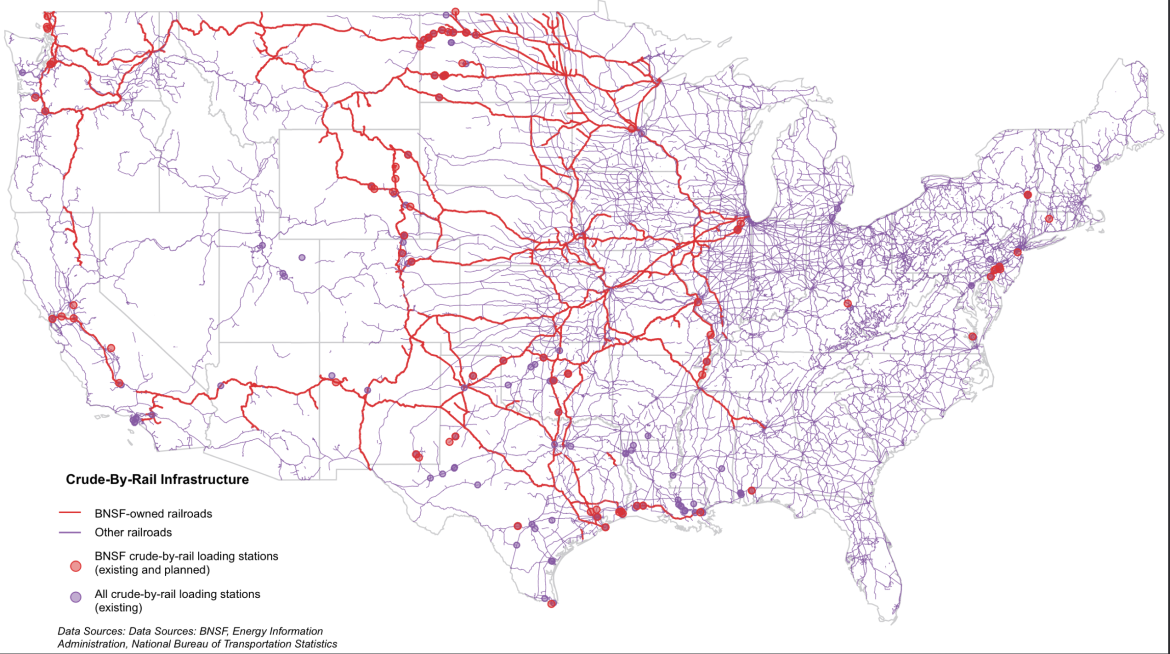The crude-by-rail story just keeps getting more interesting — and more complicated.
What we know is this:
- Crude oil transported by rail makes up a tiny percentage of total oil shipments across the country. Most is shipped via pipeline, truck or ship.
- A spike in oil production in places like the Bakken shale field in North Dakota has resulted in a corresponding spike in oil train traffic. Sources differ slightly, but in 2013 over 400,000 carloads of crude traveled on U.S. railroads – a 75% increase over 2012, and a 14-fold increase since 2010.
- One railway, BNSF, carries most of the crude. In this data-rich web post yesterday, Inside Energy’s Jordan Wirfs-Brock reported that in 2013, four out of every five carloads of crude oil and natural gas originated on a BNSF railway.

Jordan Wirfs-Brock / Inside Energy
This map shows BNSF-owned railroad lines and crude-by-rail loading facilities (in red), as well as infrastructure owned by other railroad companies. Although we can’t be sure where exactly railroad companies are routing train, this map serves as a starting point.
Here’s what we don’t know about these shipments:
- Train frequency
- Oil volume and composition
- Train routing
News organizations like Inside Energy are chipping away at this huge story.
We reported a few days ago that, in response to a new federal law requiring notification of large shipments of Bakken crude, railroad companies are requiring states to agree NOT to disclose the information to the public. Guy Cameron, Director of Homeland Security in Wyoming, said crude train movements were sensitive security information, and therefore exempt from public disclosure laws:
“Should there be a sense of concern for a terroristic act, the law gives us the appropriate and lawful ability to deny a request, based on that concern.”
According to the Wyoming Press Association’s Jim Angell, that’s the first time the state has used the so-called “terrorism exemption” to avoid revealing transportation data. To overrule Homeland Security here, the case would have to be made in district court that revealing crude oil routes was not a security issue.
But a number of states have refused to sign nondisclosure agreements, citing open records laws. And now, in Washington state, BNSF has been given until June 24 to get a court order to avoid releasing the information to McClatchy newspapers. McClatchy had filed an open records request with the state.
McClatchy also reports that an activist group in Washington state has started to take matters into their own hands and monitor the train activity through a number of different communities. They’ve found that at least one train a day travels through Washington state to coastal refineries, and they’re posting their findings on twitter with the hashtag #waoiltrainwatch.
The group has called on others to form an International Oil Train Activists network. No sign of that group yet, at least not in Colorado, Wyoming or North Dakota.
In Oregon, Rob Davis of the Oregonian has been covering this issue for some time. He reported earlier this week that the state has NOT signed a non-disclosure agreement, but is “evaluating”:
“We do not have a resolution on the confidentiality,” said Rich Hoover, spokesman for the State Fire Marshal’s office, told Davis: “We continue to evaluate the process.”








